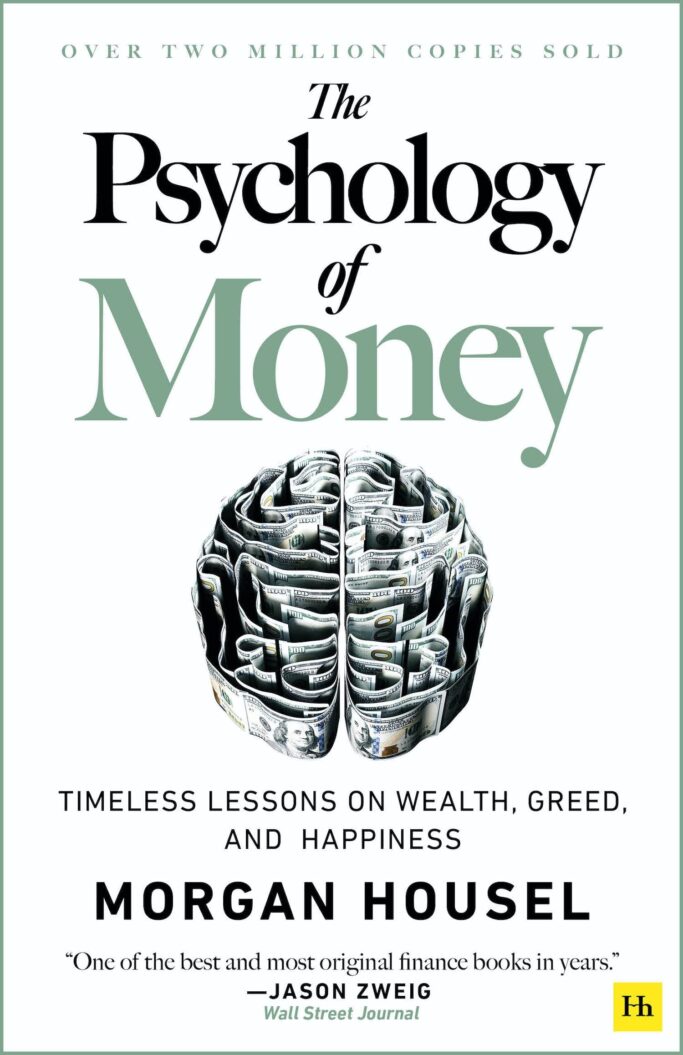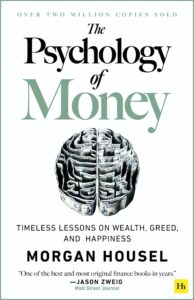
The Psychology of Money: Timeless Lessons on Wealth, Greed, and Happiness
Author: Morgan Housel Category: Personal Finance Publisher: Harriman House Published: 9 September 2020 ISBN: 0857197681 Tags: finance strategies | financial goals | financial independence | financial literacy | financial wellness | money management | money management skills | personal finance | wealth creation | More DetailsMorgan Housel is a thought-provoking and insightful book that explores the complex dynamics between money and human behavior.
In this summary, we will cover all the chapters of the book, highlighting their key concepts and elaborating on their significance.

Chapter 1: No One’s Crazy
Housel opens the book by emphasizing the diversity of financial decisions people make. He explains that what may seem irrational or illogical to one person may be completely rational to another. By understanding this fundamental concept, we can avoid judgment and better comprehend the varied perspectives people have regarding money.
Chapter 2: Luck & Risk
The author discusses the critical role luck plays in our financial outcomes. He explains that while luck can influence our successes and failures, risk management is within our control. Housel highlights the importance of preparing for the unexpected and adopting a long-term perspective when navigating the uncertainties of life.
Chapter 3: Never Enough
This chapter explores the concept of “enough” and how our perceptions of wealth and sufficiency constantly change. Housel argues that finding contentment and defining what is truly enough for ourselves is crucial to achieving happiness and financial well-being.
Chapter 4: Confounding Compounding
Compounding is a powerful force in wealth creation, yet it often goes unnoticed due to its gradual nature. Housel illustrates the exponential growth of compounding and encourages readers to start investing early and remain patient to reap its long-term benefits.
Chapter 5: Getting Wealthy vs. Staying Wealthy
Housel examines the difference between becoming wealthy and staying wealthy. He highlights the significance of financial behaviors such as frugality, humility, and adaptability in maintaining wealth over time. By avoiding unnecessary risks and focusing on sustainable strategies, individuals can preserve their financial well-being.
Chapter 6: Tails, You Win
In this chapter, Housel delves into the role of extreme outcomes, or “tails,” in shaping our financial lives. He emphasizes the need to prepare for rare and unpredictable events that can have a profound impact on our finances. Developing resilience and building a robust financial plan are essential for navigating these unexpected challenges.
Chapter 7: Freedom
Freedom is not necessarily about having an abundance of money; it is about having control over our time and choices. Housel explores the relationship between money and freedom, urging readers to define what freedom means to them personally and align their financial decisions accordingly.
Chapter 8: Man in the Car Paradox
The author introduces the concept of status and the paradox it presents. While wealth and status often go hand in hand, the pursuit of status can be financially detrimental. Housel suggests prioritizing financial independence and personal happiness over societal expectations and the need for external validation.
Chapter 9: Wealth is What You Don’t See
Housel discusses the invisible aspects of wealth that are often overlooked. He explains that true wealth lies not in material possessions or outward displays of affluence but in financial security, peace of mind, and the freedom to make choices that align with our values.
Chapter 10: Save Money
Saving money is a fundamental practice for building wealth. Housel explores the various ways individuals can save, emphasizing the importance of consistent habits and conscious decision-making to achieve financial goals.
Chapter 11: Reasonable Investing
Investing is a subject fraught with complexities and uncertainties. Housel highlights the importance of adopting a reasonable approach to investing, avoiding excessive risk-taking, and focusing on long-term strategies rather than short-term gains.
Chapter 12: Room for Error
Acknowledging and preparing for mistakes is crucial in financial decision-making. Housel explains that errors are an inherent part of the learning process and should be viewed as opportunities for growth. By allowing room for error, individuals can navigate financial challenges more effectively.
Chapter 13: You’ll Change
Change is inevitable, and our financial priorities and goals will evolve over time. Housel emphasizes the importance of embracing change and adjusting our financial strategies accordingly. Being adaptable and open to new opportunities is key to long-term financial success.
Chapter 14: Never Enough Redux
In the final chapter, Housel revisits the concept of “enough” and encourages readers to reflect on their personal definition of financial sufficiency. He concludes by emphasizing the value of relationships, experiences, and the pursuit of a meaningful life beyond money.
In “The Psychology of Money,” Morgan Housel provides readers with timeless lessons that challenge traditional notions of wealth, greed, and happiness. By understanding the psychological aspects of money, individuals can make more informed financial decisions, cultivate healthier relationships with money, and ultimately find greater satisfaction in their lives.
Back
